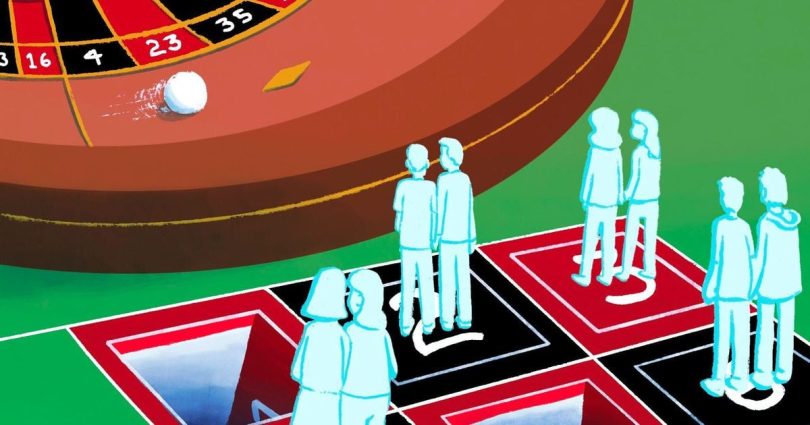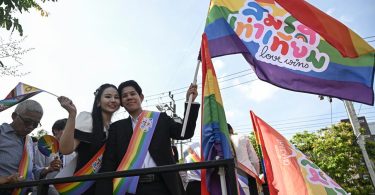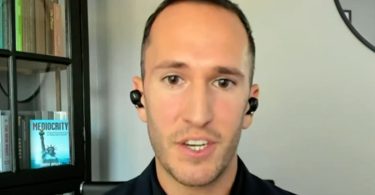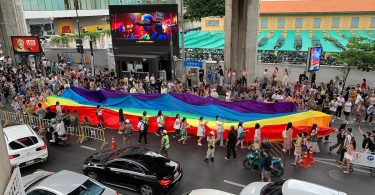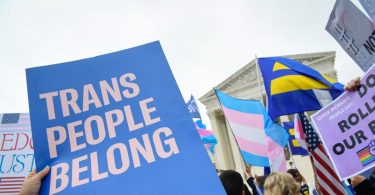Janette Petersen, a lifelong member of The Church of Jesus Christ of Latter-day Saints, didn’t think much of it when she heard that her stake president wanted to meet with her.
Maybe this regional lay leader wanted to offer her a volunteer assignment, also known as a calling. Or maybe he just wanted to see how life was going for the 31-year-old with a baby boy and a wife, Tammy, who, despite not being a church member, attended faithfully with her each Sunday.
For the first several minutes of their conversation, Petersen thought she was right about the reason for the meeting. Then came the clearing of the throat, the slight adjustment in the chair and, she said, her heart “just dropped.”
Petersen, who lives in West Orange, Texas, said the stake president informed her that, because she was married to a woman, she was breaking the faith’s law of chastity. Unless she sought a divorce, she recalled him saying, a council would be held to determine whether to withdraw her church membership.
While the Utah-based church, with 17.2 million members around the world, teaches that same-sex attraction is not a sin, it insists acting on it is and remains adamantly opposed to same-sex marriage.
(Janette Petersen) Janette Petersen, middle, and wife Tammy celebrate their son’s first birthday. Petersen’s Latter-day Saint membership was withdrawn earlier this year after she refused to seek a divorce.
Still, Petersen was confused. After all, the former Latter-day Saint missionary and Tammy had been married for nearly five years. Why was this happening now? And why to her?
Through social media, she had learned of Charlie Bird, a former Cosmo the Cougar mascot for church-owned Brigham Young University, and his husband, Ryan Clifford, a famously active and married gay couple in Utah. Word had it they were allowed to not just keep their membership, but also hold callings and participate in the sacrament, or Communion. She said her stake president acknowledged that he knew about Bird and Clifford.
“So, I asked, ‘Why is there so much inconsistency?’” she recalled. “Why can he be married and…I’m over here getting kicked out?”
To which, she said, he responded: “‘Not all stake presidents take seriously their jobs as judges in Israel.’”
In other words: leadership roulette.
Patchwork punishment
This phenomenon, familiar to Latter-day Saints across the globe, refers to the power of local lay leaders to shape the experiences of their congregants — even in a church as hierarchical and regimented as the one Petersen had grown up attending.
The implications can be minor (what music counts as “appropriate” for youth dances) or more significant (whether female leaders can sit on the stand during Sunday services). In cases like Petersen’s, they can cost a person’s membership.
Three other women — another couple living in Texas and a woman living in Utah — in same-sex marriages cited leadership roulette as primary factors, as far as they could tell, in their own membership removals.
“This is 100% speculation, but we believe it was because of a new bishop,” said the Utah woman, who married in 2021. She and her wife had their memberships removed a little more than a year later (she asked that her name not be used “out of respect for those within the church who continue to love and support us”).
In Petersen’s case, she believes she was able to fly below her stake president’s radar for the first couple of years in her marriage partly because her job kept her from attending church regularly. Only after a promotion allowed her to participate weekly (including the week of stake conference, a regional gathering of congregations) did she receive a summons. Had her leader been more of the ilk of Bird and Clifford’s, she believes that she would have been allowed to remain in full membership.
The other Texas couple, whose membership was withdrawn earlier this year after four months of marriage, thought it was significant that their council was called shortly after a new stake president was installed (they also requested that their names not be used for fear of retribution).
In contrast, Ryan and Liz Giles of the Instagram account The Fourth Option have lived in two wards, or congregations — one in Houston and their current ward in Yakima, Washington — since their marriage in 2021. They have yet to have their membership challenged.
(Ryan and Liz Giles) Married in 2021, Ryan and Liz Giles have remained active Latter-day Saints. To date, they have yet to have their memberships challenged.
“I would guess it has more to do with leadership roulette than anything,” Ryan said, explaining that extends past stake presidents to higher-ranking area authorities, who “may push excommunication when local leaders may wish to just leave things alone or offer more freedoms.”
Indeed, both Petersen and the other Texas couple said their bishops each told them they were against the final decision to withdraw their memberships.
Petersen’s bishop did not provide a comment for The Salt Lake Tribune, and the newspaper was unable to reach the other couple’s bishop.
Official church guidance for local leaders
According to the church’s General Handbook for local leadership, a membership council “may be necessary” in the case of same-sex marriage.
The Tribune reached out to the church for clarification on the factors that ultimately decide whether a council is called. A spokesperson responded with excerpts from the same handbook.
“Only a man and a woman who are legally and lawfully wedded as husband and wife should have sexual relations,” it reads. “In God’s sight, moral cleanliness is very important. Violations of the law of chastity are very serious. Those involved misuse the sacred power God has given to create life.”
Whether a membership council occurs depends, it continues, “on many circumstances. For example, a council is more likely to be necessary to help a member repent if he or she has violated temple covenants or if the sin was repetitive.”
Other factors include, among other things, the “magnitude of the sin” and “evidence of repentance.”
All three women said the law of chastity was cited either verbally or in letters informing them of the councils’ decisions as the reason for their removal.
Petersen took this information and, with the support of her wife, came back to the stake president with an offer: What if she and Tammy were no longer intimate?
It wasn’t enough.
“He said,” she recounted, “‘Well, you’ll still be in the appearance of sin.’”
She recalled him then asking if she wanted to attend the membership council.
“And I said, ‘No, I don’t. Because, in your eyes, the only solution is to break up [my son’s] parents,’” she remembered. “‘That’s the only solution for you — to break up a family.’”
Petersen said she received notification of the council’s verdict to withdraw her membership on Mother’s Day.
“This decision will release you from the covenants that you have made with the Lord,” the letter stated, “and allow you to partake of his mercies while you travel the path of repentance.”
The letter didn’t specify the reason for her loss of membership, instead focusing on her opportunity to “draw closer to your Savior and feel the love he has for you.”
The Tribune made multiple unsuccessful attempts to reach the stake president, whom the church recently promoted to an area Seventy.
‘Why did it happen to us?’
Even if Bird and Clifford were to one day find themselves under the leadership of someone less friendly to queer Latter-day Saints like them trying to remain in the fold, the women agreed: The couple, with their almost 300,000 Instagram followers between them and titles with church owned-Deseret Book, are almost certainly safe.
“It just hurts,” one of the Texas women said. “If we had more of a social following, if we had people on our side, if we knew someone in Salt Lake, I think we would have had a better chance. It’s about who you know.”
The Utah woman echoed this, explaining she had just had her membership rescinded when Bird and Clifford announced their marriage.
“I had three thoughts at the exact same time,” she recalled. “The first was: I am so excited for the two of them. The second was: Oh, no. What is going to happen to them now? And the third that immediately followed was: But if they’re membership isn’t withdrawn, why did it happen to us?”
Bird and Clifford did not respond to requests for comment.
Support from ward members
Individuals who lose their membership are told, among other counsel, that they can no longer participate in temple rites, give a sermon, pray at church or pay tithing. They are still permitted and even encouraged — as Petersen was — to attend Sunday worship services.
Petersen and the other women interviewed still go to church, largely because, they said, their fellow congregants have been a source of comfort and support.
Shortly after the Texas couple’s membership council (a five-hour ordeal that, they both agreed, ranked as one of the worst experiences of their lives), their bishop dropped by unannounced while one of them was home pulling weeds. It was 98 degrees and the man was in a suit, but he knelt in the dirt beside the woman and began tugging at the green shoots.
“He said, ‘I can’t tell you how much I wish the [council members] would have asked me what I felt about the whole thing, even though I know my opinion doesn’t hold sway,’” the woman remembered. “‘I would have stood and told them that you two should not have been there. …The ones who want to stay, the ones who want to worship, the ones who want to be at church and bring their kids to church, the moms — they are not the ones who are meant to be [called to a membership council].”
That visit, she said, meant a lot to her and her wife, even if it didn’t end with their names getting back on the books (and even if he “wasn’t very good at weeding”).
When asked if church is a positive experience for her and her wife, the Utah woman responded with a resounding, “absolutely.”
“The people who want us there and are very open about wanting us there, they are our protectors,” she said. “They just want to make sure we’re happy and safe and healthy.”
Petersen said the same has been true in her ward, located on the border between Texas and Louisiana.
Those whose membership has been withdrawn aren’t permitted, per the church’s handbook, to comment in lessons. So Petersen said she had been dutifully sitting on her hands when a teacher, after class, pulled her aside and told her to contribute whenever she wanted.
When Petersen reminded her of the rule, the woman was undeterred.
“‘I might just call on you,’” Petersen remembered her saying, ‘”to give a prayer and dare someone to challenge me.’”
Especially gratifying, she said, have been the times when individuals have come up to her and cited her example as the reason they still attend church — despite their own struggles with the institution.
“We have people in our ward,” one of the Texas women said, “that have just looked at us and said, ‘I’m here because you two are still here.’ I think that’s really cool.”
Choosing to remain
It’s unclear how many same-sex couples are on church rolls, or how many have been or are being removed from them.
When asked if she thought whether her and others’ ouster represented a kind of larger crackdown, the Utah woman said she didn’t think so. Rather, she said, she believes they are the result of a possible positive shift underway among the church’s gay and lesbian members.
Based on her own observations, she believes “there are more individuals and couples stepping into their authenticity” as both queer and Latter-day Saints.
Ben Schilaty, a gay Latter-day Saint and co-host of the podcast “Questions From the Closet” with Bird, said the same.
(Photo courtesy of Ben Schilaty)
Ben Schilaty, a licensed therapist and former BYU Honor Code administrator, has written a book titled “A Walk in My Shoes: Questions I’m Often Asked as a Gay Latter-day Saint.”
“In the past, I observed a lot of people feeling like they have to choose between being in the church and being in a same-sex relationship,” said Schilaty, who recently accepted a position teaching social work at Utah Valley University. “Now I’m seeing that many people don’t feel like they have to make that choice. They can do both.”
A hand to hold
As Petersen left her stake president’s office that fateful afternoon, her fussy baby squirming in her arms, she felt heavy with grief. Then, sitting in the driver seat, another feeling took over.
“I felt this intense love,” she said, pausing with emotion at the memory, “and it was just so overwhelming that I was just like, ‘Whoa, I don’t even feel this about my son.’”
Something, she said, told her everything was going to be OK.
Which is not to say easy.
Particularly devastating has been seeing the wedge the withdrawal of her membership has been between her family members, who have been overwhelmingly supportive of her — and the church.
She decided, nonetheless, to put her trust in that feeling throughout the days and weeks that have followed.
“I’ve definitely been holding someone’s hand,” she said, “whether that be Christ or whether that be a loved relative that’s passed. I know that I constantly have had someone with me since then.”
Editor’s note • This story is available to Salt Lake Tribune subscribers only. Thank you for supporting local journalism.

